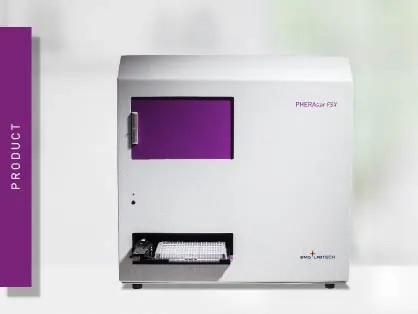
PHERAstar FSX
Powerful and most sensitive HTS plate reader
Professor David James and his talented research group at the University of Sydney are at the forefront of understanding type 2 diabetes and how we can prevent and treat this disease, which now affects over 1 million Australians. David kindly shared his experience with BMG LABTECH and how BMG LABTECH’s microplate readers have supported his research.
This week, Diabetes Australia is running the campaign “It’s About Time” to raise awareness about the importance of early detection and treatment of diabetes. The highly acclaimed Professor David James and his talented research group at the University of Sydney are at the forefront of understanding type 2 diabetes and how we can prevent and treat this disease, which now affects over 1 million Australians. David kindly shared his experience with BMG LABTECH and how BMG LABTECH’s microplate readers have supported his research.
Professor David James has devoted his professional career to understanding metabolism, signal transduction and disease. His discovery and cloning of the insulin regulatable glucose transporter GLUT4, enabled David to understand the key steps of how insulin regulates glucose transport in muscle and fat cells, which are now major therapeutic targets in diabetes.
David and his extensively experienced laboratory team are at the forefront of metabolic and systems biology research. They have improved our understanding of metabolic processes involved in insulin resistance and also the impact of diet and exercise on disease, which are closely linked to type 2 diabetes.
“Insulin signalling and action are defective both during and prior to the onset of a range of diseases including type 2 diabetes, cardiovascular disease, certain cancers and neurological disease. Major factors contribute to insulin resistance including obesity, physical inactivity and ageing. Our multidisciplinary team uses mouse, fly and cellular models to elucidate the cellular processes that occur in response to perturbations such as diet, exercise and hormones like insulin. We utilise large scale “omic” approaches including proteomics, phosphoproteomics, transcriptomics and metabolomics coupled with bioinformatics to find new molecular targets for disease. Our goal is to define the key molecular targets of metabolic disease and hence, discover new targets for therapeutic intervention” said David.
“Our BMG LABTECH FLUOstar Omega microplate reader is an integral part of our daily research. We utilise this at all stages of our research, from quantifying protein and DNA content to analysing insulin and glucose levels from cell and animal systems. The BMG LABTECH FLUOstar OMEGA microplate reader allows high throughput quantification of our assays that utilise absorbance or fluorescence based measurements allowing us to quantify key cellular processes in our research such as lipolysis, glucose transport and many more.”
David’s success is attested by over 200 papers published in an impressive selection of prestigious journals and a significant collection of awards for his outstanding contribution to diabetes research. David’s awards include the Glaxo Wellcome Medal for Medical Research, the Kellion medal for outstanding contributions to Diabetes research, the ANZCDBS Presidents Medal for contributions to cell biology and the NSW Premier’s prize for medical research. David is also a fellow of the Australian Academy of Science and Ullman Chair in Systems Biology at the Charles Perkins Centre.

David attributes this success to the excellence and dedication of his team. “I have had the privilege of working with a gifted group of postdoctoral fellows from all over the world. We also have a broad range of national and international collaborators including with Jake Lusis at UCLA, one of the leaders in using different mouse strains to explore diversity” said David.
For more information on Professor David James and the contribution of his research group to type 2 diabetes research, click here. Learn more about Diabetes Australia’s “It’s About Time” campaign by visiting www.itsabouttime.org.au. #NDW2018 and #Itsabouttime.
Powerful and most sensitive HTS plate reader
Most flexible Plate Reader for Assay Development
Flexible microplate reader with simplified workflows
Upgradeable single and multi-mode microplate reader series